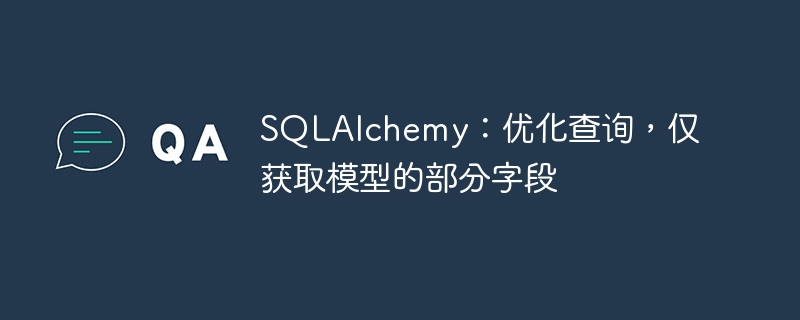SQLAlchemy只查部分字段的高效方法
时间:2025-09-03 15:51:49 157浏览 收藏
大家好,今天本人给大家带来文章《SQLAlchemy只查部分字段的优化方法》,文中内容主要涉及到,如果你对文章方面的知识点感兴趣,那就请各位朋友继续看下去吧~希望能真正帮到你们,谢谢!

本文旨在解决 SQLAlchemy 中查询数据库时,如何只获取模型的部分字段,避免加载不必要的数据,从而优化查询性能的问题。通过对比不同的查询方式,深入探讨 load_only 选项的使用,并强调缓存可能带来的影响,帮助开发者更高效地使用 SQLAlchemy。
SQLAlchemy 中选择特定列的两种方法
在使用 SQLAlchemy 进行数据库查询时,有时我们只需要获取表中的部分列,而不是全部列。这可以减少数据传输量,提高查询效率。 SQLAlchemy 提供了多种方法来实现这个目标。
方法一:直接选择特定列
最直接的方法是在 select 语句中指定需要查询的列。
from sqlalchemy import select from sqlalchemy.orm import Session # 假设 PostSQL 是你的模型类 # query = select(PostSQL.id, PostSQL.title) # result = session.execute(query) # posts = result.all() # print(posts) # Output: [(1, 'hello'), (2, 'hello')]
这种方法返回的结果是一个元组的列表,每个元组包含所选列的值。这种方式简单直接,避免了创建完整的模型对象,适用于只需要部分字段的场景。
示例
from sqlalchemy import create_engine, Column, Integer, String
from sqlalchemy.orm import sessionmaker
from sqlalchemy.ext.declarative import declarative_base
Base = declarative_base()
class PostSQL(Base):
__tablename__ = 'posts'
id = Column(Integer, primary_key=True)
title = Column(String)
content = Column(String)
# 假设还有其他列,例如 author, created_at, updated_at
engine = create_engine('sqlite:///:memory:') # 使用内存数据库进行演示
Base.metadata.create_all(engine)
Session = sessionmaker(bind=engine)
session = Session()
# 插入一些示例数据
post1 = PostSQL(title='Hello World', content='This is the first post.')
post2 = PostSQL(title='Another Post', content='This is the second post.')
session.add_all([post1, post2])
session.commit()
# 查询 id 和 title 列
from sqlalchemy import select
query = select(PostSQL.id, PostSQL.title)
result = session.execute(query)
posts = result.all()
print(posts) # Output: [(1, 'Hello World'), (2, 'Another Post')]
session.close()方法二:使用 load_only 选项
另一种方法是使用 load_only 选项。这种方法会返回完整的模型对象,但只从数据库中加载指定的列。
from sqlalchemy.orm import load_only # query = select(PostSQL).options(load_only(PostSQL.id, PostSQL.title)) # result = session.execute(query) # posts = result.scalars().all() # print(posts) # Output: [<PostSQL object at ...>, <PostSQL object at ...>] # for post in posts: # print(post.id, post.title)
注意事项
- 缓存问题: 需要注意的是,如果之前已经加载过完整的模型对象, SQLAlchemy 可能会从缓存中读取数据,而不是从数据库中重新加载。这可能导致 load_only 选项失效。解决方法是清除缓存,或者确保在第一次查询时就使用 load_only 选项。
- Pycharm/Python 缓存: 某些 IDE 或 Python 环境可能会缓存查询结果,导致 load_only 选项看似没有生效。尝试清除 IDE 或 Python 的缓存,重新运行代码。
- 异步环境: 在异步环境中使用 SQLAlchemy 时,确保正确使用 await 关键字,并检查异步数据库连接池的配置。
示例
from sqlalchemy import create_engine, Column, Integer, String
from sqlalchemy.orm import sessionmaker, load_only
from sqlalchemy.ext.declarative import declarative_base
Base = declarative_base()
class PostSQL(Base):
__tablename__ = 'posts'
id = Column(Integer, primary_key=True)
title = Column(String)
content = Column(String)
# 假设还有其他列,例如 author, created_at, updated_at
engine = create_engine('sqlite:///:memory:') # 使用内存数据库进行演示
Base.metadata.create_all(engine)
Session = sessionmaker(bind=engine)
session = Session()
# 插入一些示例数据
post1 = PostSQL(title='Hello World', content='This is the first post.')
post2 = PostSQL(title='Another Post', content='This is the second post.')
session.add_all([post1, post2])
session.commit()
# 使用 load_only 查询 id 和 title 列
from sqlalchemy import select
query = select(PostSQL).options(load_only(PostSQL.id, PostSQL.title))
result = session.execute(query)
posts = result.scalars().all()
for post in posts:
print(f"Post ID: {post.id}, Title: {post.title}")
# 尝试访问 post.content 会导致延迟加载或错误,取决于配置
# print(post.content)
session.close()总结
- 如果只需要部分字段的值,建议直接在 select 语句中指定需要查询的列,返回元组列表,避免创建完整的模型对象。
- 如果需要完整的模型对象,但只想加载部分列,可以使用 load_only 选项。但要注意缓存问题,并确保在第一次查询时就使用 load_only 选项。
- 在异步环境中,确保正确使用 await 关键字,并检查异步数据库连接池的配置。
- 清除 IDE 或 Python 的缓存,可以解决一些看似 load_only 选项失效的问题。
通过选择合适的方法,可以有效地优化 SQLAlchemy 的查询性能,提高应用程序的效率。
以上就是《SQLAlchemy只查部分字段的高效方法》的详细内容,更多关于的资料请关注golang学习网公众号!
相关阅读
更多>
-
501 收藏
-
501 收藏
-
501 收藏
-
501 收藏
-
501 收藏
最新阅读
更多>
-
345 收藏
-
397 收藏
-
399 收藏
-
350 收藏
-
247 收藏
-
384 收藏
-
247 收藏
-
385 收藏
-
343 收藏
-
228 收藏
-
442 收藏
-
213 收藏
课程推荐
更多>
-

- 前端进阶之JavaScript设计模式
- 设计模式是开发人员在软件开发过程中面临一般问题时的解决方案,代表了最佳的实践。本课程的主打内容包括JS常见设计模式以及具体应用场景,打造一站式知识长龙服务,适合有JS基础的同学学习。
- 立即学习 543次学习
-

- GO语言核心编程课程
- 本课程采用真实案例,全面具体可落地,从理论到实践,一步一步将GO核心编程技术、编程思想、底层实现融会贯通,使学习者贴近时代脉搏,做IT互联网时代的弄潮儿。
- 立即学习 516次学习
-

- 简单聊聊mysql8与网络通信
- 如有问题加微信:Le-studyg;在课程中,我们将首先介绍MySQL8的新特性,包括性能优化、安全增强、新数据类型等,帮助学生快速熟悉MySQL8的最新功能。接着,我们将深入解析MySQL的网络通信机制,包括协议、连接管理、数据传输等,让
- 立即学习 500次学习
-

- JavaScript正则表达式基础与实战
- 在任何一门编程语言中,正则表达式,都是一项重要的知识,它提供了高效的字符串匹配与捕获机制,可以极大的简化程序设计。
- 立即学习 487次学习
-

- 从零制作响应式网站—Grid布局
- 本系列教程将展示从零制作一个假想的网络科技公司官网,分为导航,轮播,关于我们,成功案例,服务流程,团队介绍,数据部分,公司动态,底部信息等内容区块。网站整体采用CSSGrid布局,支持响应式,有流畅过渡和展现动画。
- 立即学习 485次学习
